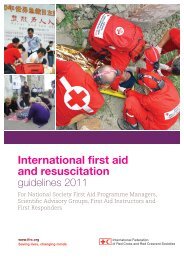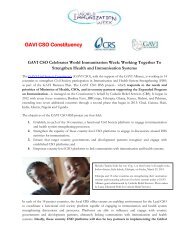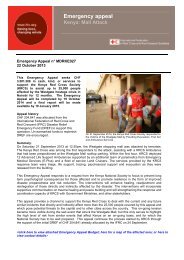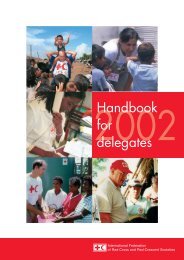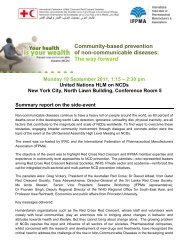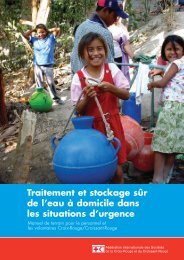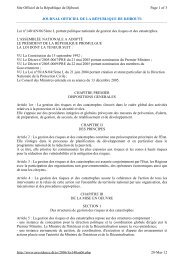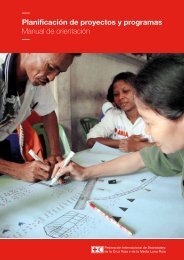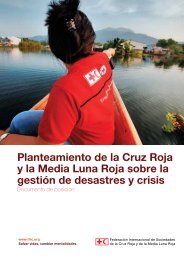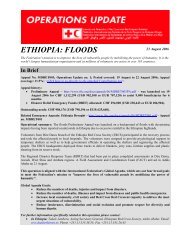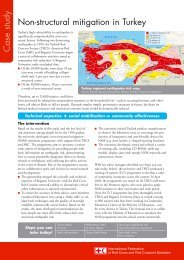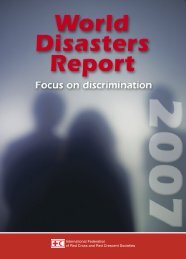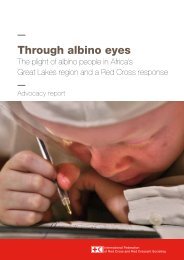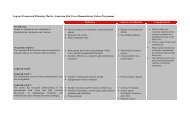World Disasters Report 2010 - International Federation of Red Cross ...
World Disasters Report 2010 - International Federation of Red Cross ...
World Disasters Report 2010 - International Federation of Red Cross ...
Create successful ePaper yourself
Turn your PDF publications into a flip-book with our unique Google optimized e-Paper software.
human rights standards and humanitarian principles<br />
into their work.<br />
The IFRC promotes the Youth as Agents <strong>of</strong><br />
Behavioural Change programme, which invites<br />
children to participate in role-playing games or<br />
visualization exercises and then discuss their emotions.<br />
For example, a group forms a circle and<br />
prevents others from breaking through, a game<br />
that teaches empathy for excluded immigrants.<br />
The games are an instinctive, non-cognitive<br />
88<br />
way to learn compassion, active listening, critical<br />
thinking, non-judgement, mediation and a<br />
peaceful resolution <strong>of</strong> tensions. Games and<br />
exercises are adapted to meet the needs and<br />
challenges <strong>of</strong> each national context and peer<br />
education is essential. “The programme is about<br />
changing mindsets, attitudes and behaviour in<br />
a society and how youth can play a leadership<br />
role in that,” said IFRC’s Katrien Beeckman, who<br />
founded the programme. �<br />
The future <strong>of</strong> urban violence<br />
At best, however, these strategies can only hope to lessen the impact <strong>of</strong> violence in the<br />
targeted communities. This is not to deny the important progress that has been made<br />
through community-centred approaches and development initiatives. For example, the<br />
adoption <strong>of</strong> targeted social programmes that deal directly with the problem <strong>of</strong> poverty,<br />
such as the Benazir Bhutto Income Support Programme in Pakistan, Progresiva in Mexico<br />
or Bolsa Familia in Brazil and other conditional cash transfer schemes, have helped reduce<br />
income inequality in targeted communities. But these gains are threatened by global<br />
economic conditions, ageing populations and the failure to extend the benefits through<br />
reforms that improve the quality and reach <strong>of</strong> health and education services nationally. For<br />
example, while developed countries regularly spend up to 18 per cent <strong>of</strong> total government<br />
expenditure on health, Kenya spends only 6.1 per cent, Jamaica barely 4.2 per cent and<br />
Pakistan a paltry 1.3 per cent. And while important progress has been made in the number<br />
<strong>of</strong> children attending primary and secondary school education, the quality is <strong>of</strong>ten<br />
appalling. In Brazil where 70.4 per cent <strong>of</strong> the population is qualified as ‘low education<br />
attainment’ in the UN Development Programme’s 2009 Human Development Index, a<br />
quarter <strong>of</strong> the education budget is spent on free university education while primary and<br />
secondary education is neglected. In parts <strong>of</strong> Pakistan, the female literacy rate is 3 per cent.<br />
Regardless <strong>of</strong> how sophisticated the economic models used to develop government<br />
strategies to cushion the effects <strong>of</strong> economic crisis and support income redistribution<br />
are, no amount <strong>of</strong> social spending or development programming innovations will be<br />
able to withstand the corrosive impact <strong>of</strong> corruption or to resist being derailed by elite<br />
groups if the political system does not establish equality before the law. The principle<br />
that the law <strong>of</strong> the land should apply equally to all is a cornerstone <strong>of</strong> a free society<br />
and one which is <strong>of</strong>ten markedly absent in countries where urban violence is rife. The<br />
discretionary application <strong>of</strong> tax codes, zoning laws, public procurement and contracting<br />
regulations, criteria for public appointments, restrictions on the exploitation <strong>of</strong><br />
natural resources and even court rulings, benefits the few and establishes a neo-feudal<br />
hierarchy <strong>of</strong> elite groups, special interests and favoured individuals, creating one <strong>of</strong> the<br />
most powerful incentives for widespread crime and violence. <strong>International</strong> assistance



